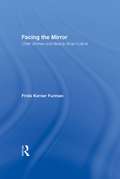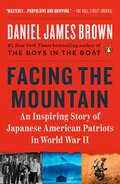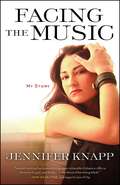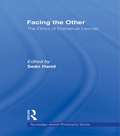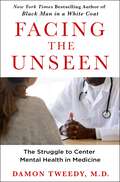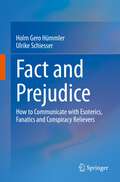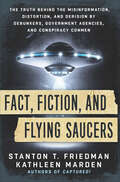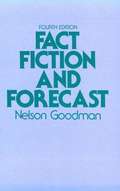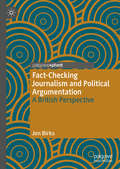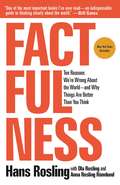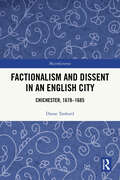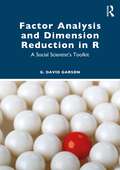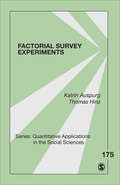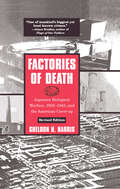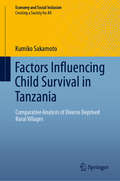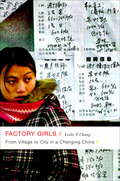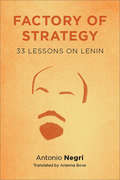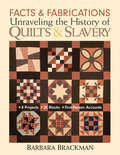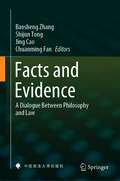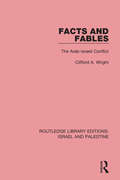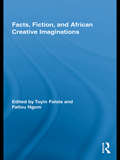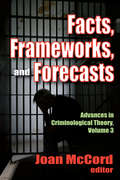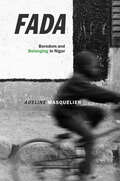- Table View
- List View
Facing the Mirror: Older Women and Beauty Shop Culture
by Frida FurmanThis innovative, ethnographic study of a neighborhood beauty salon investigates how customers constitute a lively, affirming community of peers during their weekly visits. Facing the Mirror gives voice to older women, who, in a sexist and ageist society, are frequently devalued and rendered invisible. These older, mostly Jewish women articulate their experiences of bodily self-presentation, femininity, aging, and caring pertaining to their lives within and outside Julie's International Salon. This book explores the socio-moral significance of these experiences which reveals as much about society as about older women themselves. Women's narratives expose structures of power, inequality, and resistance in the ways women perceive reality, make choices and live in their worlds.
Facing the Mountain: An Inspiring Story of Japanese American Patriots in World War II
by Daniel James BrownA NEW YORK TIMES BESTSELLEROne of NPR's "Books We Love" of 2021Longlisted for the PEN/Jacqueline Bograd Weld Award for Biography Winner of the Christopher Award &“Masterly. An epic story of four Japanese-American families and their sons who volunteered for military service and displayed uncommon heroism… Propulsive and gripping, in part because of Mr. Brown&’s ability to make us care deeply about the fates of these individual soldiers...a page-turner.&” – Wall Street Journal From the #1 New York Times bestselling author of The Boys in the Boat, a gripping World War II saga of patriotism and resistance, focusing on four Japanese American men and their families, and the contributions and sacrifices that they made for the sake of the nation.In the days and months after Pearl Harbor, the lives of Japanese Americans across the continent and Hawaii were changed forever. In this unforgettable chronicle of war-time America and the battlefields of Europe, Daniel James Brown portrays the journey of Rudy Tokiwa, Fred Shiosaki, and Kats Miho, who volunteered for the 442nd Regimental Combat Team and were deployed to France, Germany, and Italy, where they were asked to do the near impossible. Brown also tells the story of these soldiers' parents, immigrants who were forced to submit to life in concentration camps on U.S. soil. Woven throughout is the chronicle of Gordon Hirabayashi, one of a cadre of patriotic resisters who stood up against their government in defense of their own rights. Whether fighting on battlefields or in courtrooms, these were Americans under unprecedented strain, doing what Americans do best—striving, resisting, pushing back, rising up, standing on principle, laying down their lives, and enduring.
Facing the Music
by Jennifer KnappJennifer Knapp's meteoric rise in the Christian music industry ended abruptly when she walked away and came out publicly as a lesbian. This is her story--of coming to Christ, of building a career, of admitting who she is, and of how her faith remained strong through it all.At the top of her career in the Christian music industry, Jennifer Knapp quit. A few years later, she publicly revealed she is gay. A media frenzy ensued, and many of her former fans were angry with what they saw as turning her back on God. But through it all, she held on to the truth that had guided her from the beginning. In this memoir, she finally tells her story: of her troubled childhood, the love of music that pulled her through, her dramatic conversion to Christianity, her rise to stardom, her abrupt departure from Christian Contemporary Music, her years of trying to come to terms with her sexual orientation, and her return to music and Nashville in 2010, when she came out publicly for the first time. She also talks about the importance of her faith, and despite the many who claim she can no longer call herself a believer, she maintains that she is both gay and a Christian. Now an advocate for LGBT issues in the church, Jennifer has witnessed heartbreaking struggles as churches wrestle with issues of homosexuality and faith. This engrossing, inspiring memoir will help people understand her story and to believe in their own stories, whatever they may be.
Facing the Other: The Ethics of Emmanuel Levinas (Routledge Jewish Studies Series)
by Sean HandEmmanuel Levinas is one of the key philosophers in the post-Heideggerian field and an increasingly central presence in contemporary debates about identity and responsibility. His work spans and encapsulates the major philosophical and ethical concerns of the twentieth century, combining the insights of a basic phenomenological training with the demands of a Jewish culture and its basis in the endless exegesis of Talmudic reading. His concerns and subjects are wide: they include the Other, the body, infinity, women, Jewish-Christian relations, Zionism and the impulses and limits of philosophical language itself. This collection explicates Levinas's major contribution to these debates, namely the idea of the primacy of ethics over ontology or epistemology. It investigates how, in the wake of a post-structuralist orthodoxy, scholars and practitioners in such fields as literary theory, cultural studies, feminism and psychoanalysis are turning to Levinas's work to articulate a rediscovered concern with the ethical dimension of their discipline. Stressing the largely assumed but unexplored Jewish dimension of Levinas's work, this book is an important contribution to the field of Jewish studies and philosophy.
Facing the Unseen: The Struggle to Center Mental Health in Medicine
by Damon TweedyFrom the New York Times bestselling author of Black Man in a White Coat comes a powerful and urgent call to center psychiatry and mental health care into the mainstream of medicineAs much as we all might wish that mental health problems, with their elusive causes and unsettling behaviors, simply did not exist, millions of people suffer from them, sometimes to an extreme extent. Many others face addiction to alcohol and other drugs, as overdose and suicide deaths abound. Yet the vast majority of doctors receive minimal instruction in treating these conditions during their lengthy medical training. This mismatch ignores the clear overlap between physical and mental distress, and too-often puts psychiatrists on the outside looking in as the medical system continues to fail many patients. In Facing The Unseen, bestselling author, professor of psychiatry, and practicing physician Damon Tweedy guides us through his days working in outpatient clinics, emergency rooms, and hospitals as he meets people from all walks of life who are grappling with physical and psychological illnesses. In powerful, compassionate, and eloquent prose, Tweedy argues for a more comprehensive and integrated approach where people with mental illness have a health care system that places their full well-being front and center.
Fackenheim's Jewish Philosophy
by Michael L. MorganEmil L. Fackenheim, one of the most significant Jewish thinkers of the twentieth century, is best known for his deep and rich engagement with the implications of the Nazi Holocaust on Jewish thought, Christian theology, and philosophy. However, his career as a philosopher and theologian began two decades prior to his first efforts to confront that horrific event. In this book, renowned Fackenheim expert Michael L. Morgan offers the first examination of the full scope of Fackenheim's 60-year career, beyond simply his work on the Holocaust.Fackenheim's Jewish Philosophy explores the most important themes of Fackenheim's philosophical and religious thought and how these remained central, if not always in immutable ways, over his entire career. Morgan also provides insight into Fackenheim's indebtedness to Kant, Hegel, and rabbinic midrash, as well as the changing character of his philosophical "voice." The work concludes with a chapter evaluating Fackenheim's legacy for present and future Jewish philosophy and philosophy more generally.
Fact and Prejudice: How to Communicate with Esoterics, Fanatics and Conspiracy Believers
by Holm Gero Hümmler Ulrike SchiesserWhen having coffee with your family, you are offered energized water. On Twitter you discuss with vaccination opponents. The WhatsApp kitagroup discusses zodiac signs, the pharmacy sells you globules, the neighbor proselytizes for her guru, and the news is once again about demonstrations by right-wing extremists.Everywhere you encounter conspiracy myths, superstition, esotericism, pseudoscience and Co. and you want to respond to them - while remaining as factual as possible, clarify your position, provide facts, but also not unnecessarily provoke or overload. In addition, you do not want to hurt your counterpart, but to encourage him to rethink. But how do you do that?If you are asking yourself this question, read "Fact and Prejudice". Understand why we are driven by emotions and most information bounces off us. Read experiences and tips from interviews with professional (science) communicators. Then follow different people through their own rethinking processes: What convinces an alternative medicine practitioner to leave non-evidence-based medicine behind? What was the deciding factor for a former vaccination opponent to have her children vaccinated after all? What helps members of appropriative organizations to get out? What moves a celebrated medium to break away from esotericism?This book is for anyone who worries about or doesn't know how to communicate with people who have irrational worldviews - whether it's with family, friends, anonymously on the Internet, or at work. The authors give concrete tips on discussions and situations and also help to decide when it is important to engage and when it is better to withdraw.
Fact, Fiction, and Flying Saucers: The Truth Behind the Misinformation, Distortion, and Derision by Debunkers, Government Agencies, and Conspiracy Conmen
by Stanton T. Friedman Kathleen Marden“An excellent, in-depth book that gets to the heart of how, and why, the UFO subject has been smeared, ridiculed, and targeted by disinformation agents.” —Nick Redfern, author of Men in BlackThere is a clear conspiracy to deny the existence of UFOs.The mainstream media has misinformed us for years about UFO studies conducted by highly regarded scientists associated with some of the finest universities in the country. There is significant evidence that the US government has covered up the alien presence through misinformation, distortion, obfuscation, and ridicule. Some prominent, politically connected scientists have engaged in the cover up. And a few professional writers have helped to successfully label any scientists who have been persuaded by the evidence and brave enough to take a stand as unscientific charlatans, fanatics, and kooks.Fact, Fiction, and Flying Saucers examines the wealth of archival documents that clearly demonstrate this cooperative disinformation effort and refute the false claims made by these professional scoffers. Friedman and Marden set the record straight by examining politically motivated misinformation and presenting the compelling evidence that separates fact from fiction. They reveal:The most compelling UFO evidence, including a variety of large-scale scientific studies.The current state of UFOlogy and what the future holds.The media’s role in disclosure and denial.The government scientists whose job it is to deny.The Air Force, FBI, CIA, and NSA’s involvement.
Fact, Fiction, and Forecast
by Nelson GoodmanHere, in a new edition, is Nelson Goodman’s provocative philosophical classic―a book that, according to Science, “raised a storm of controversy” when it was first published in 1954, and one that remains on the front lines of philosophical debate. <p><p> How is it that we feel confident in generalizing from experience in some ways but not in others? How are generalizations that are warranted to be distinguished from those that are not? Goodman shows that these questions resist formal solution and his demonstration has been taken by nativists like Chomsky and Fodor as proof that neither scientific induction nor ordinary learning can proceed without an a priori, or innate, ordering of hypotheses. <p> In his new foreword to this edition, Hilary Putnam forcefully rejects these nativist claims. The controversy surrounding these unsolved problems is as relevant to the psychology of cognitive development as it is to the philosophy of science. No serious student of either discipline can afford to misunderstand Goodman’s classic argument.
Fact-Checking Journalism and Political Argumentation: A British Perspective
by Jen BirksThis timely book examines the role of fact-checking journalism within political policy debates, and its potential contribution to public engagement. Understanding facts not to operate in a political vacuum, the book argues for a wide remit for fact-checking journalism beyond empirically-checkable facts, to include the causal relationships and predictions that form part of wider political arguments and are central to electoral pledges. Whilst these statements cannot be proven or disproven, fact-checking can, and sometimes does, ask pertinent critical questions about the premises of those claims and arguments. The analysis centres on the three dedicated national British fact-checkers during the UK’s 2017 snap general election, including their activity and engagement on Twitter. The book also makes a close political discourse and argumentation analysis of three key issue debates in flagship reporting from Channel 4 News and the BBC.
Fact-Finding Before the International Court of Justice
by Devaney James GerardFact-Finding before the International Court of Justice examines a number of significant recent criticisms of the way in which the ICJ deals with facts. The book takes the position that such criticisms are warranted and that the ICJ's current approach to fact-finding falls short of adequacy, both in cases involving abundant, particularly complex or technical facts, and in those involving a scarcity of facts. The author skilfully examines how other courts such as the WTO and inter-State arbitrations conduct fact-finding and makes a number of select proposals for reform, enabling the ICJ to address some of the current weaknesses in its approach. The proposals includes, but are not limited to, the development of a power to compel the disclosure of information, greater use of provisional measures, and a clear strategy for the use of expert evidence.
Factfulness: Ten Reasons We're Wrong About The World--and Why Things Are Better Than You Think
by Hans Rosling Anna Rosling Rönnlund Ola Rosling<P>Factfulness: The stress-reducing habit of only carrying opinions for which you have strong supporting facts. <P>When asked simple questions about global trends—what percentage of the world’s population live in poverty; why the world’s population is increasing; how many girls finish school—we systematically get the answers wrong. So wrong that a chimpanzee choosing answers at random will consistently outguess teachers, journalists, Nobel laureates, and investment bankers. <P>In Factfulness, Professor of International Health and global TED phenomenon Hans Rosling, together with his two long-time collaborators, Anna and Ola, offers a radical new explanation of why this happens. They reveal the ten instincts that distort our perspective—from our tendency to divide the world into two camps (usually some version of us and them) to the way we consume media (where fear rules) to how we perceive progress (believing that most things are getting worse).
Factionalism and Dissent in an English City: Chichester, 1678-1685 (Microhistories)
by Danae TankardThis book is about the political and religious controversies that beset the small English city of Chichester between 1678 and 1685, which intersected with wider political turbulence at the heart of government and in the nation at large. This period of seventeenth-century English history has been overshadowed by the more dramatic events of the English Civil War and the Glorious Revolution, but these years were marked by repeated political crises, assassination plots, religious persecution, and fears of a new civil war. Telling this story through the lives of the inhabitants of one city offers an intimate view of how these events played out in a particular locality.As much a work of social history as it is of political history, this book has the lives of individual men and women at its core. The story that unfolds includes a strong cast of characters and has multiple points of high drama: it is the individuals and the events they were caught up in that propel the narrative forwards.Factionalism and Dissent in an English City makes a significant contribution to the historiography of late Restoration England. Its plot-and character-driven narrative structure also makes the book accessible to a non-specialist reader who wants to find out what it might have been like to live through these challenging years.
Factor Analysis and Dimension Reduction in R: A Social Scientist's Toolkit
by G. David GarsonFactor Analysis and Dimension Reduction in R provides coverage, with worked examples, of a large number of dimension reduction procedures along with model performance metrics to compare them. Factor analysis in the form of principal components analysis (PCA) or principal factor analysis (PFA) is familiar to most social scientists. However, what is less familiar is understanding that factor analysis is a subset of the more general statistical family of dimension reduction methods. The social scientist's toolkit for factor analysis problems can be expanded to include the range of solutions this book presents. In addition to covering FA and PCA with orthogonal and oblique rotation, this book’s coverage includes higher-order factor models, bifactor models, models based on binary and ordinal data, models based on mixed data, generalized low-rank models, cluster analysis with GLRM, models involving supplemental variables or observations, Bayesian factor analysis, regularized factor analysis, testing for unidimensionality, and prediction with factor scores. The second half of the book deals with other procedures for dimension reduction. These include coverage of kernel PCA, factor analysis with multidimensional scaling, locally linear embedding models, Laplacian eigenmaps, diffusion maps, force directed methods, t-distributed stochastic neighbor embedding, independent component analysis (ICA), dimensionality reduction via regression (DRR), non-negative matrix factorization (NNMF), Isomap, Autoencoder, uniform manifold approximation and projection (UMAP) models, neural network models, and longitudinal factor analysis models. In addition, a special chapter covers metrics for comparing model performance. Features of this book include: * Numerous worked examples with replicable R code * Explicit comprehensive coverage of data assumptions * Adaptation of factor methods to binary, ordinal, and categorical data * Residual and outlier analysis * Visualization of factor results * Final chapters that treat integration of factor analysis with neural network and time series methods Presented in color with R code and introduction to R and RStudio, this book will be suitable for graduate-level and optional module courses for social scientists, and on quantitative methods and multivariate statistics courses.
Factorial Survey Experiments
by Katrin Auspurg Thomas HinzFilling a gap in the literature of the field, Factorial Survey Experiments provides researchers with a practical guide to using the factorial survey method to assess respondents’ beliefs about the world, judgment principles, or decision rules through multi-dimensional stimuli (“vignettes”) that resemble real-life decision-making situations. Using insightful examples to illustrate their arguments, authors Katrin Auspurg and Thomas Hinz guide researchers through all relevant steps, including how to set up the factorial experimental design (drawing samples of vignettes and respondents), how to handle the practical challenges that must be mastered when an experimental plan with many different treatments is embedded in a survey format, and how to deal with questions of data analysis. In addition to providing the “how-tos” of designing factorial survey experiments, the authors cover recent developments of similar methods, such as conjoint analyses, choice experiments, and more advanced statistical tools.
Factories of Death: Japanese Biological Warfare, 1932-45 and the American Cover-Up
by Sheldon H. HarrisFactories of Death details the activities of the Japanese army scientists that conducted numerous horrifying experiments upon live human beings. It investigates who from the upper echelons of the Japanese military and political establishments knew of the experiments, also the question of whether or not Allied POWs were subjected to such tests, and the nature of the deal that was brokered with US authorities after the war. This new edition has been completely updated, and contains an entirely new chapter detailing the numerous revelations that have surfaced since the book's initial publication in 1994.
Factors Influencing Child Survival in Tanzania: Comparative Analysis of Diverse Deprived Rural Villages (Economy and Social Inclusion)
by Kumiko SakamotoThis book addresses the essential topic of child survival in Tanzania, especially focusing on the role of mutual assistance, which has received little attention to date. Further, it identifies a range of key factors for child survival by combining a literature review, regional data analysis, and case studies. These studies center on rural villages in high Under-5 mortality rate (U5MR) regions and assess their strengths and weaknesses regarding child survival. By focusing on deprived rural areas as of 2002 and evaluating the improvements in the 2012 census data, the book also highlights the potential held by rural semi -subsistence economies. An analysis of the focus villages indicates that children in food-sharing circles had better chances of survival. However, food sharing is not necessarily inclusive; a significant number of children have fallen out of such circles, especially in mainland villages. Furthermore, monetary support for children’s medicine has often failed to arrive in time. Lastly, the book argues that, in addition to direct factors such as access to health services, water and sanitation, food intake, and education, it is essential that children receive inclusive support at various levels: family, community, village, national, and international.
Factory Girls: From Village to City in a Changing China
by Leslie T. ChangAn eye-opening and previously untold story,Factory Girlsis the first look into the everyday lives of the migrant factory population in China. China has 130 million migrant workers—the largest migration in human history. InFactory Girls, Leslie T. Chang, a former correspondent for theWall Street Journalin Beijing, tells the story of these workers primarily through the lives of two young women, whom she follows over the course of three years as they attempt to rise from the assembly lines of Dongguan, an industrial city in China’s Pearl River Delta. As she tracks their lives, Chang paints a never-before-seen picture of migrant life—a world where nearly everyone is under thirty; where you can lose your boyfriend and your friends with the loss of a mobile phone; where a few computer or English lessons can catapult you into a completely different social class. Chang takes us inside a sneaker factory so large that it has its own hospital, movie theater, and fire department; to posh karaoke bars that are fronts for prostitution; to makeshift English classes where students shave their heads in monklike devotion and sit day after day in front of machines watching English words flash by; and back to a farming village for the Chinese New Year, revealing the poverty and idleness of rural life that drive young girls to leave home in the first place. Throughout this riveting portrait, Chang also interweaves the story of her own family’s migrations, within China and to the West, providing historical and personal frames of reference for her investigation. A book of global significance that provides new insight into China,Factory Girlsdemonstrates howthe mass movement from rural villages to cities is remaking individual lives and transforming Chinese society, much as immigration to America’s shores remade our own country a century ago.
Factory of Strategy: Thirty-Three Lessons on Lenin (Insurrections: Critical Studies in Religion, Politics, and Culture)
by Antonio NegriFactory of Strategy is the last of Antonio Negri's major political works to be translated into English. Rigorous and accessible, it is both a systematic inquiry into the development of Lenin's thought and an encapsulation of a critical shift in Negri's theoretical trajectory.Lenin is the only prominent politician of the modern era to seriously question the "withering away" and "extinction" of the state, and like Marx, he recognized the link between capitalism and modern sovereignty and the need to destroy capitalism and reconfigure the state. Negri refrains from portraying Lenin as a ferocious dictator enforcing the proletariat's reappropriation of wealth, nor does he depict him as a mere military tool of a vanguard opposed to the Ancien Régime. Negri instead champions Leninism's ability to adapt to different working-class configurations in Russia, China, Latin America, and elsewhere. He argues that Lenin developed a new political figuration in and beyond modernity and an effective organization capable of absorbing different historical conditions. He ultimately urges readers to recognize the universal application of Leninism today and its potential to institutionally—not anarchically—dismantle centralized power.
Facts & Fabrications: From Practice To Perfection -- Troubleshooting Guide -- 50+ Designs
by Barbara Brackman“A renowned quilt historian . . . present[s] what she considers to be an accurate assessment of slavery, quilts and the Underground Railroad.” —TimeRecall an unforgettable phase of our nation’s history with America’s leading quilt historian. Barbara Brackman presents the most current research on the role of quilts during the time of slavery, emancipation, and the Underground Railroad. Nine quilt projects combine historic blocks with Barbara’s own designs.Did quilts really lead the way to freedom? What role did quilts play? Barbara explores the stories surrounding the Underground Railroad.Read about the people who were there! First-person accounts, newspaper and military records, and surviving quilts all add clues. YOU decide how to interpret the stories and history, fabrication and facts as you learn about this fascinating time in history. Excellent resource for elementary through high school learners—curriculum included! “Quilters interested in African American slavery and quilting will find many historically accurate, teachable moments within these pages. The first-personal accounts by slaves of their quilt making, quilt parties, and stolen quilts make emotional reading. A must-have book for your quilting library!” —Kyra Hicks, author of Black Threads“Brackman skillfully assembles accurate historical evidence along with beautiful quilt examples infused with slave-era symbolism.” —Dr. Carolyn Mazloomi, author of Threads of Faith“Many of persons featured or quoted are women with a connection to the ‘peculiar institution’: slaves, escaped slaves, freed slaves, plantation owners, abolitionists, and so forth . . . teaches history through quilting and offers fun projects for history-minded quilters . . . the stories offer good starting points for one’s own research and the projects are beautiful.” —Beth’s Bobbins
Facts and Evidence: A Dialogue Between Philosophy and Law
by Jing Cao Baosheng Zhang Shijun Tong Chuanming FanThis book presents an in-depth discussion on two concepts from the field of philosophy and law, in order to improve our understanding of the relation between “fact” and “evidence” in judicial process. Since fact-finding is a difficult task for judges, proof by evidence has been devised to help them access the truth. However, in the process of judicial fact-finding, there is always a gap between fact and truth. This book covers a wide range of topics, from reflections on the concept of “fact,” “evidence” and “fact-finding” in the field of philosophy and law to individual case studies. As such it is a useful reference resource on the continuing research on the judicial proof process for students and scholars.
Facts and Fables: The Arab-Israeli Conflict (Routledge Library Editions: Israel and Palestine)
by Clifford A. WrightThe Arab-Israeli conflict is one of the greatest threats to world peace today. Yet for all the importance and passion of this conflict very little is actually known about the story behind the headlines. Behind each confrontation and each act of terrorism is a long and deep story. This primer on the Arab-Israeli conflict, first published in 1989, examines the real stories behind the conflict and separates fact from fable. By carefully documenting, each claim and counter-claim, many widely-held beliefs are unmasked as myths.
Facts, Fiction, and African Creative Imaginations (Routledge African Studies)
by Toyin Falola Fallou NgomThis volume brings together insights from distinguished scholars from around the world to address the facts, fiction and creative imaginations in the pervasive portrayals of Africa, its people, societies and cultures in the literature and the media. The fictionalization of Africa and African issues in the media and the popular literature that blends facts and fiction has rendered perceptions of Africa, its cultures, societies, customs, and conflicts often superficial and deficient in the popular Western consciousness. The book brings eminent scholars from a variety of disciplines to sort out the persistent fictionalization of Africa, from facts pertaining to the genesis of powerful cultural, political or religious icons, the historical and cultural significance of "intriguing" customs (such as tribal marks), gender relations, causes of conflicts and African responses, and creative imaginations in contemporary African films, fiction and literature, among others.
Facts, Frameworks, and Forecasts (Advances In Criminological Theory Ser.)
by Joan McCordFacts, Frameworks, and Forecasts calls for rethinking the development of criminological theory. In her introduction, Joan McCord argues that the field is ready for new approaches and that its progress depends on a sound factual base. Examining the discipline's research design, methodology, and quantitative analysis efforts, the contributors identify significant advances in criminological theory. This empirical orientation results in a balanced blend of information and speculation.This book contains a comprehensive review. The first chapter describes biological conditions that have theoretical links with criminal behavior - ending with a discussion of how biological and social conditions may interact to influence criminal behavior. Early chapters discuss general issues related to crime. These are followed by expositions of theoretical orientations not typically found in criminological literature. The second half of the book describes seven longitudinal studies in four countries. The authors interpret their data to expose biological, social, and psychological factors they believe may influence criminal behavior.These contributors include: Guenther Knoblich and Roy King, Daniel Glaser, Robert A. Rosellini and Robin L. Lashley, Robert J. Sampson, Ellen S. Cohn and Susan O. White, Joan McCord, L. Rowell Huesmann and Leonard D. Eron, Robert Cairns and Beverly Cairns, Richard E. Tremblay, Patricia Cohen and Judith S. Brook, David P. Farrington and David Magnussen, Britt af Klinteberg, and Hakan Stattin.Facts, Frameworks, and Forecasts addresses the observation of noted criminologist Marvin Wolfgang that criminological theory had stagnated. This groundbreaking work, available in paperback for the first time, is as relevant now as when first published. It should be read by all concerned with data-related approaches to criminology.
Fada: Boredom and Belonging in Niger
by Adeline MasquelierNiger most often comes into the public eye as an example of deprivation and insecurity. Urban centers have become concentrated areas of unemployment filled with young men trying, against all odds, to find jobs and fill their time with meaningful occupations. At the heart of Adeline Masquelier’s groundbreaking book is the fada—a space where men gather to escape boredom by talking, playing cards, listening to music, and drinking tea. As a place in which new forms of sociability and belonging are forged outside the unattainable arena of work, the fada has become an integral part of Niger’s urban landscape. By considering the fada as a site of experimentation, Masquelier offers a nuanced depiction of how young men in urban Niger engage in the quest for recognition and reinvent their own masculinity in the absence of conventional avenues to self-realization. In an era when fledgling and advanced economies alike are struggling to support meaningful forms of employment, this book offers a timely glimpse into how to create spaces of stability, respect, and creativity in the face of diminished opportunities and precarity.
